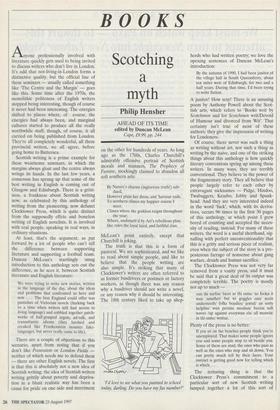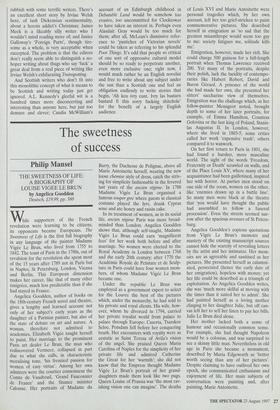BOOKS
Scotching a myth
Philip Hensher
AHEAD OF ITS TIME edited by Duncan McLean Cape, £9.99, pp. 244 Anyone professionally involved with literature quickly gets used to being invited to discuss writers who don't live in London. It's odd that not-living-in-London forms a distinctive quality, but the official line of these seminars — usually called something like 'The Centre and the Margin' — goes like this. Some time after the 1970s, the monolithic politeness of English writers stopped being interesting, though of course it never had been interesting. The energies shifted to places where, of course, the energies had always been, and marginal cultures started to produce all the really worthwhile stuff, though, of course, it all carried on being published from London. They're all completely wonderful, all these provincial writers, we all agree, before going home to Battersea.
Scottish writing is a prime example for these wearisome seminars, in which the margins always gloat and the centre always wrings its hands. In the last few years, a consensus has sprung up that some of the best writing in English is coming out of Glasgow and Edinburgh. There is a gritti- ness, a frankness about Scottish writing now, as celebrated by this anthology of writing from the pioneering, now defunct Clocktower Press, which is quite distinct from the supposedly effete and boneless writing of English novelists. It is involved with real people, speaking in real ways, in ordinary situations.
At least, that's the argument, as put forward by a lot of people who can't tell the difference between supporting literature and supporting a football team. Duncan McLean's startlingly smug introduction to this anthology sets out the difference, as he sees it, between Scottish literature and English literature:
We were trying to write new stories, written in the language of the day, about the ideas and problems that confronted us here and now . . . The best England could offer was pastiches of Victorian novels (harking back to a time when writers still had access to living language) and cobbled together patch- works of half-grasped argots, ad-talk, and transatlantic idioms (they lurched and creaked like Frankenstein monster fake- languages, but never really came to life).
There are a couple of objections to this scenario, apart from noting that if you don't like Possession or London Fields neither of which needs me to defend them — there are other English novels. The first is that this is absolutely not a new idea of Scottish writing; the idea of Scottish writers writing grittily about poverty and depriva- tion in a blunt realistic way has been a cause for pride on one side and merriment on the other for hundreds of years. As long ago as the 1760s, Charles Churchill's admirably offensive portrait of Scottish morals and manners, The Prophecy of Famine, mockingly claimed to abandon all soft southern arts:
By Nature's charms (inglorious truth!) sub- dued, However plain her dress, and 'haviour rude, To northern climes my happier course I steer, Climes where the goddess reigns throughout the year; Where, undisturb'd by Art's rebellious plan, She rules the loyal laird, and faithful clan.
McLean's point entirely, except that Churchill is joking.
The truth is that this is a form of pastoral. We are sophisticated, and we like to read about simple people, and like to believe that the people writing are also simple. It's striking that many of Clocktower's writers are often referred to as former busdrivers or postmen or factory workers, as though there was any reason why a busdriver should not write a novel, or any reason why it should be interesting. The 18th century liked to take up shep- 'I'd love to see what you painted in school today, darling. Do you have my fax number?' herds who had written poetry; we love the opening sentences of Duncan McLean's introduction: By the autumn of 1990, I had been janitor of the village hall in South Queensferry, about ten miles west of Edinburgh, for two and a half years. During that time, I'd been trying to write fiction.
A janitor! How sexy! There is an amusing poem by Anthony Powell about the Scot- tish arts, which refers to 'Books writ by Scotchmen and for Scotchmen writ/Devoid of Humour and divorced from Wit'. That certainty isn't true of most of these authors; they give the impression of writing for Londoners.
Of course, there never was such a thing as writing without Art, nor such a thing as writing by the naive, and one of the striking things about this anthology is how quickly literary conventions spring up among these writers. In many ways, they are terribly conventional. They believe in the power of the fragmentary story. They all believe that people largely refer to each other by extravagant nicknames — Pidge, Hindoo, Twabuggers, Keasbo, Jobby and Spunk- head. And they are very interested indeed in the word 'fuck', which, with its deriva- tives, occurs 96 times in the first 30 pages of this anthology, at which point I grew bored of counting and accepted the neces- sity of reading, instead. For many of these writers, the word is a useful shorthand, sig- nalling with perfect unconventionality that this is a gritty and serious piece of realism, even when the subject of the story is a pre- posterous farrago of nonsense about gang warfare, druids and human sacrifice.
The Clocktower Press was not very far removed from a vanity press, and it must be said that a great deal of its output was completely terrible. The poetry is mostly not up to much —
oan thi surfiss/ faces ur thi same/ no tookn it wun /anuther/ but wi goggles oan/ seein underneeth/ folks boadies/ jentul/ an sorry helpliss/ wun persins moshun/ beetin soft waves /up against everywun els/ all moovin/ in thi same/ wottur.
Plenty of the prose is no better:
If you sit on the benches people think you're unemployed. That makes some people ignore you and some people stop to sit beside you. Some of them are mad, the ones who pass as well as the ones who stop and sit down. You can pretty much tell by their faces. Your instinct is getting good now for telling which is which.. .
The irritating thing is that the Clocktower Press's commitment to a particular sort of new Scottish writing lumped together a lot of this sort of rubbish with some terrific writers. There's an excellent short story by Irvine Welsh here, of lush Dickensian sentimentality, about a heroin addict's Christmas; James Meek is a likeably silly writer who I wouldn't mind reading more of; and Janice Galloway's 'Foreign Parts', though tire- some as a whole, is very acceptable when excerpted. The problem is that the editors don't really seem able to distinguish a no- hoper writing about thugs who say 'fuck' a great deal from a real piece of writing like Irvine Welsh's exhilarating Trainspotting.
And Scottish writers who don't fit into this monolithic concept of what it means to be Scottish and writing today just get ignored. A.L. Kennedy's gleeful wit is a hundred times more disconcerting and interesting than anyone here, but just too demure and clever; Candia McWilliam's account of an Edinburgh childhood in Debatable Land would be somehow too evasive, too uncommitted for Clocktower to have taken an interest in. Perhaps even Alasdair Gray would be too much for them; after all, McLean's dismissive refer- ence to 'pastiches of Victorian novels' could be taken as referring to his splendid Poor Things. It's odd that people so critical of one sort of oppressive cultural model should be so ready to perpetrate another, even more exclusive one; right now, I would much rather be an English novelist and free to write about any subject under the sun than a Scottish one and feel an obligation endlessly to write stories that begin, `Ah ken ivry cunt. Ivry las bastarn bastard fi this sorry fucking shitehole' for the benefit of a largely English audience.



























































 Previous page
Previous page